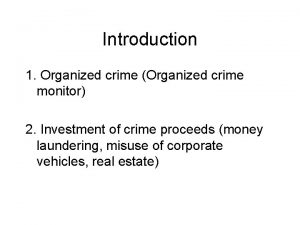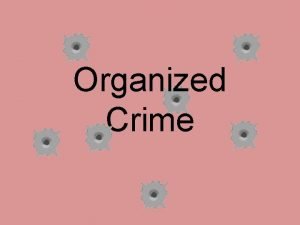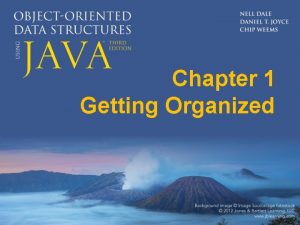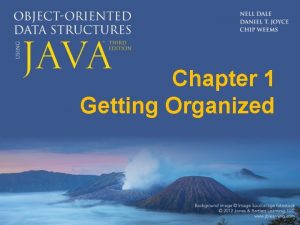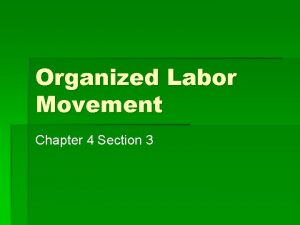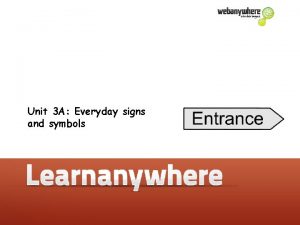The Rules of Organized Lawmaking The Everyday Rules


















- Slides: 18

The Rules of Organized Lawmaking


The Everyday Rules 1) The Senate and House make their own set of rules according to Article I section 5 2) each makes/renews their rules every 2 years 3) Length a) House – 650 pages Senate – 90 pages “Each House may determine the Rules of its Proceedings” US Constitution Article 1 Section 5

Why the difference? The House: 1) has more members and thus needs more rules 2) members don’t stay around as long in the house because of shorter terms 3) members need more structure because a lot of representatives want to get what they want done before their time is up

Example of the differences between the House and Senate due to the difference in the number of members: debate time (in the House – 5 minutes max, in the Senate – unlimited time) However sometimes the House, on certain Mondays and Tuesdays of the month suspends the rules

The Difference in Committee Rules in the House and the Senate 1) In the House a) more bills are talked about in committees - Why? b) members tend to be on less committees-Why? c) members tend to be more of an expert in their fields-Why? 2) The Senate has less members so a) there's more debate time on the floor b) senators are on more than one committee

Seating – (Facing the center) Democrats on the left, Republicans on the right - (supposedly the have separate cloakrooms and won't even sit together at their own restaurant)

The Debating Rules – in the House 1) Its all in the timing a) A) sessions usually start around noon b) B) their offices are equipped with special alarm clocks – they have buzzards and lights to help warn them when a vote is coming c) C ) their week: Monday – routine work Tues. – Thurs. - debate time Friday – slack time – Why?

Or is it all in the scheduling? A) all potential laws (better known as bills) and resolutions are dropped in the hopper (its near the front of the chamber) B) the bill is then read out loud to be put on record in front of the House but also put on record in the (House) Journal and the Congressional Record

There are 2 types of bills 1) public – bills which apply to the entire US – for example – No Child Left Behind Act 2) private – which only apply to certain people or areas – for example, Frank Wolf passing a law for more money to fix Route 7

There also resolutions (which deal with temporary issues) 1) joint resolutions – for unusual instances (like $ for the inauguration or typos) 2) concurrent resolutions – when both the House and the Senate want to declare their position on something (for example: their view on a natural disaster like Hurricane Katrina)

E) there also single riders (provisions which are added to bills at the last minute to insure their passing) F) the Speaker of the House sends them on to the committees (only 10% ever make it past this level) G) committees can: 1) give it a good review and pass it forward 2) shoot it down 3) force changes to be made to the bill 4) make changes to it themselves 5) sit on it and wait for it to be forgotten

If 218 House members want it out of committee they can force a discharge petition which will force it out of committee and onto the floor i) then its put on one of the calendars – 5 options for a bill to be labeled as: 1) Union – deals with money and property issues 2) House – major non-money issues 3) Consent/corrections – non-controversial issues 4) Private – for individual/small group/private bills 5) Discharge – the no man’s land/the trash heap – bills that probably will never be passed

3) The Traffic Cops of the Process – the House Rules Committee ) A) Considered the most powerful and oldest committee of the House ) B) decides when bills will come up in the calendar (can be petitioned to move ahead/delay bills) ) C) settles disputes amongst the other committees ) D) can decide when to keep or suspend rules ) E) Committee is usually controlled by the Speaker and the majority party – What’s the problem with this arrangement?

4) One last thing before the House starts arguing over a bill they need a quorum a) What is it? – the minimum amount of representatives needed to participate b) Needs a majority of the members of the House – 218 (they need 51 in the Senate)

The Debating Rules in the Senate 1) Any senator can introduce a bill or interrupt it 2) no rules committee – leaders themselves choose which bills to emphasize 3) 2 calendars a) General Order – all bills b) Executive Calendar – all nominations/treaties – 4) Again if it passes committee, any senator can speak on the floor – all they have to do is be recognized by the president of the Senate – who’s that?

5) The most well known aspect of Senate debate is the Filibuster – What’s this again? a) they must stand talk about the topic for the first 3 hours - after that all bets are off on what they can talk about (this has included talking about your family, recipes, and even reading the phone book) b) How it can be stopped – the cloture need 3/5 of the Senate – 60 members after that each senator can only speak for 1 hr. each

d) a filibuster also can be delayed if other business was already scheduled on the calendar (ex: State of the Union addresses)
 Lawmaking process
Lawmaking process Hươu thường đẻ mỗi lứa mấy con
Hươu thường đẻ mỗi lứa mấy con Thế nào là hệ số cao nhất
Thế nào là hệ số cao nhất Diễn thế sinh thái là
Diễn thế sinh thái là đại từ thay thế
đại từ thay thế Slidetodoc
Slidetodoc Vẽ hình chiếu vuông góc của vật thể sau
Vẽ hình chiếu vuông góc của vật thể sau Thế nào là mạng điện lắp đặt kiểu nổi
Thế nào là mạng điện lắp đặt kiểu nổi Cách giải mật thư tọa độ
Cách giải mật thư tọa độ Lời thề hippocrates
Lời thề hippocrates Vẽ hình chiếu đứng bằng cạnh của vật thể
Vẽ hình chiếu đứng bằng cạnh của vật thể Chụp phim tư thế worms-breton
Chụp phim tư thế worms-breton Quá trình desamine hóa có thể tạo ra
Quá trình desamine hóa có thể tạo ra Sự nuôi và dạy con của hươu
Sự nuôi và dạy con của hươu điện thế nghỉ
điện thế nghỉ Các châu lục và đại dương trên thế giới
Các châu lục và đại dương trên thế giới Các loại đột biến cấu trúc nhiễm sắc thể
Các loại đột biến cấu trúc nhiễm sắc thể Nguyên nhân của sự mỏi cơ sinh 8
Nguyên nhân của sự mỏi cơ sinh 8 Bổ thể
Bổ thể




















